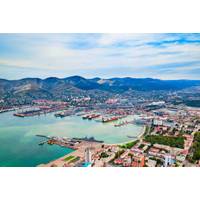Sources say that the World Bank's IFC approved Oman Polysilicon Project loan despite US objections
Two sources familiar with board voting said that the World Bank's International Finance Corporation approved on Friday a loan and an investment of up to $250,000,000 in a polysilicon production project in Oman, for solar applications. This was despite the objections from the IFC executive director in the United States.
Sources said that three other IFC executive directors, representing Germany, Netherlands, and Nordic countries, abstained on the vote for the United Solar Polysilicon Project.
United Solar is planning to build a $1.6billion plant in Oman’s Sohar Port Freezone to produce 100,000 tons of polysilicon per year. Zhang Longgen, the company's founder and chairman, is a U.S.-born American who previously served as CEO of Chinese polysilicon manufacturer Daqo New Energy Corp.
IDG Capital, a Chinese private equity investor and a key shareholder in United Solar, spent most of the last year on an American Defense Department list of Chinese military-linked companies before it was removed in December. Zhang and Oman’s sovereign wealth fund are also shareholders.
A spokesperson from the U.S. Treasury Department which controls the United States' majority shareholding at the World Bank did not respond immediately to a question about the IFC loan.
World Bank and IFC, its private sector financing arm, did not respond immediately to comments.
According to the disclosure sheet for this project, IFC plans to provide a maximum loan of $200 million as well as a preferred equity of $50 million.
The United Solar plant located in Oman could produce enough polysilicon to make solar panels that generate 40 gigawatts per year.
China is the world's largest producer of polysilicon. This material is used in solar panels and, in its purer form, as a raw materials for semiconductor manufacturing.
This sector already suffers from massive excess capacity. Last week, it was reported that Chinese polysilicon manufacturers are in discussions to spend $50 billion yuan (7 billion dollars) to shut down a third or so of their production capacity.
One source said that the U.S., as well as the countries abstaining, viewed the project as a Chinese enterprise, supplying mainly by Chinese state-owned firms and adding excess capacity to the sector.
In both its terms, the Trump administration has pressured the World Bank to cease lending to China.
The U.S. approved last year a $325-million federal grant for Michigan-based Hemlock Semiconductor to expand its production of semiconductor-grade Polysilicon in order to support the reshoring supply chain. (Reporting and additional reporting by Alexandra Alper, Editing by Leslie Adler & Tom Hogue).
(source: Reuters)



